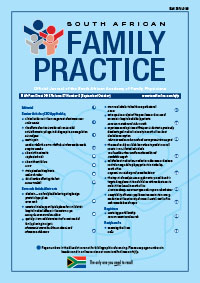The effects of corticosteroids and nonsteroidal anti-inflammatory drugs, including aspirin, on coagulation
Keywords:
coagulation, corticosteroids, nonsteroidal anti-inflammatory drugs, NSAIDs
Abstract
The immune and coagulation systems have numerous interactions, as evidenced by the increased risk of venous thromboembolism in inflammatory bowel disease. In general, proinflammatory states are prothrombotic, while a reduction in inflammation reduces thrombotic risk. Corticosteroids, such as hydrocortisone and prednisone, tend to reduce inflammation and thus thrombosis, while being prothrombotic in non-inflammatory states, e.g. Cushing’s syndrome. The nonsteroidal anti-inflammatory drugs also have a dual effect, through interaction with different cyclo-oxygenase enzyme isoforms, on platelets and the vascular endothelium.
Published
2015-09-25
Section
Review Articles
By submitting manuscripts to SAFP, authors of original articles are assigning copyright to the South African Academy of Family Physicians. Copyright of review articles are assigned to the Publisher, Medpharm Publications (Pty) Ltd, unless otherwise specified. Authors may use their own work after publication without written permission, provided they acknowledge the original source. Individuals and academic institutions may freely copy and distribute articles published in SAFP for educational and research purposes without obtaining permission.

